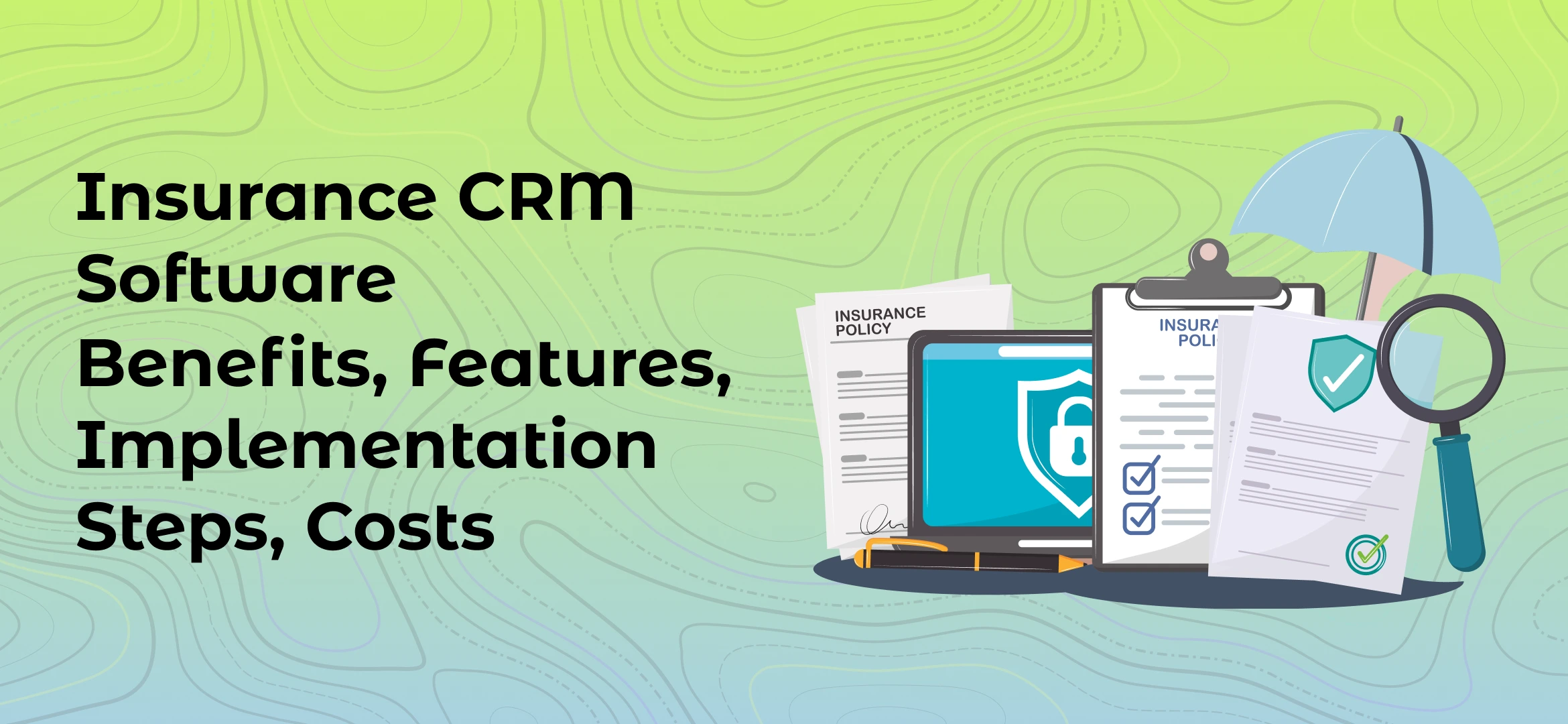Did you know that insurance agencies, on average, lose 20-40% of their customers annually due to poor communication and service? In an industry built on relationships and trust, this level of attrition is not just a statistic; it’s a significant drain on revenue and a clear indicator of the challenges facing modern insurance professionals. Juggling complex policy details, managing countless client interactions, and keeping up with ever-changing regulations can feel like navigating a storm without a compass. That’s where a robust Insurance CRM solution steps in, acting as your guiding star.
At its core, Customer Relationship Management (CRM) is a strategy and a set of technologies designed to manage and analyze customer interactions and data throughout the customer lifecycle, with the goal of improving customer service relationships and assisting in customer retention and driving sales 2 growth. It’s about centralizing information, streamlining communication, and ultimately, building stronger, more profitable relationships.
Top Advantages of Insurance CRM Software

Insurance CRM software offers a wealth of advantages that can revolutionize how your agency operates and interacts with clients. By centralizing data, automating processes, and providing valuable insights, it empowers you to deliver exceptional service and drive sustainable growth. Here’s a closer look at the key benefits:
Enhanced Client Relationship Management:
In the insurance industry, relationships are the bedrock of success. An Insurance CRM allows you to build stronger, more personalized connections with your clients. By storing detailed client profiles, including policy information, communication history, and personal preferences, you can tailor your interactions to meet their specific needs. This leads to improved client satisfaction, increased loyalty, and reduced churn. The ability to quickly access client information, respond promptly to inquiries, and provide personalized service fosters trust and strengthens long-term relationships.
Streamlined Operations and Increased Efficiency:
Insurance agencies often grapple with a multitude of administrative tasks, from policy renewals to claims processing. CRM software automates many of these repetitive processes, freeing up your team to focus on more strategic initiatives. Centralized data management eliminates the need for manual data entry and reduces the risk of errors. Improved workflow organization ensures that tasks are completed efficiently and on time. This translates to increased productivity, reduced operational costs, and a more streamlined and efficient agency.
Improved Lead Management and Sales:
Generating and converting leads is crucial for business growth. An Insurance CRM provides tools to effectively manage the entire sales pipeline, from lead capture to policy closing. You can track lead sources, qualify prospects, and nurture relationships with targeted communication. Detailed sales reports and analytics provide insights into your sales performance, allowing you to identify opportunities for improvement and optimize your sales strategy. By streamlining lead management and sales processes, you can increase conversion rates and drive revenue growth.
Data-Driven Decision-Making:
In today’s competitive landscape, data is your most valuable asset. Insurance CRM software provides comprehensive reporting and analytics capabilities, allowing you to gain valuable insights into your 1 agency’s performance. You can track key metrics, identify trends, and make informed decisions based on data. Customizable dashboards and reports provide a clear overview of your agency’s performance, enabling you to identify areas for improvement and optimize your strategies. This data-driven approach empowers you to make strategic decisions that drive growth and profitability.
Better Compliance and Security:
“The insurance industry is subject to strict regulatory requirements, and data security is paramount. Insurance CRM software helps you maintain compliance by providing secure data storage and tracking compliance-related activities. Features such as audit trails and access controls ensure that sensitive client information is protected and that your agency adheres to industry regulations. This not only mitigates the risk of costly penalties but also builds trust with your clients, who expect their data to be handled with the utmost care.
Features of Insurance CRM Software

The power of Insurance CRM software lies in its comprehensive set of features, each designed to address the specific needs of insurance agencies. These features work in harmony to streamline operations, enhance client relationships, and drive growth. Here’s a breakdown of the key functionalities you should look for:
A. Contact and Policy Management:
This is the foundation of any robust Insurance CRM. It allows you to store and manage detailed client profiles, including contact information, policy details, and communication history. You can easily track policy renewals, manage documents, and access client information in seconds. This centralized system ensures that you have a complete view of each client, enabling personalized service and efficient policy management. This feature should allow easy access to policy documents, and renewal dates, as well as customizable fields to capture unique client information.
B. Lead and Opportunity Management:
Effective lead management is crucial for sales growth. Insurance CRM software provides tools to capture, qualify, and nurture leads. You can track leads through the sales pipeline, manage quotes, and forecast sales. This ensures that no potential client slips through the cracks and helps you optimize your sales strategy. Features such as automated lead scoring and sales pipeline visualization can greatly enhance your sales team’s efficiency.
C. Communication and Collaboration Tools:
Seamless communication is essential for building strong client relationships. Insurance CRM software integrates email, call logging, and internal messaging, allowing your team to communicate effectively with clients and collaborate internally. This ensures that everyone is on the same page and that client interactions are tracked and documented. Features like automated email campaigns and call scripting can improve the efficiency and consistency of your communication.
D. Claims Management:
Efficient claims management is critical for client satisfaction and retention. Insurance CRM software streamlines the claims process, allowing you to track claims, manage documentation, and communicate with clients throughout the process. This ensures that claims are handled promptly and efficiently, minimizing client frustration and building trust. This part of the CRM will ideally integrate with claims processing software, and track all communication regarding a claim.
E. Reporting and Analytics:
Data-driven decision-making is essential for success in today’s competitive landscape. Insurance CRM software provides comprehensive reporting and analytics capabilities, allowing you to track key performance indicators, identify trends, and 1 make informed decisions. Customizable dashboards and reports provide insights into your agency’s performance, helping you identify areas for improvement and optimize your strategies. This should include reporting on sales, client retention, and claim resolution times.
F. Integration Capabilities:
Insurance agencies often use a variety of software tools. Insurance CRM software should integrate seamlessly with other systems, such as policy administration software, accounting software, and marketing automation platforms. This integration ensures that data flows smoothly between systems, eliminating data silos and improving efficiency. API integrations are a must for maximum compatibility.
G. Mobile Accessibility:
In today’s fast-paced world, mobile access is essential. Insurance CRM software should offer mobile accessibility, allowing you to access client information, manage tasks, and communicate with clients on the go. This ensures that you can stay connected and productive, even when you’re away from the office. Mobile apps that offer full functionality are ideal.
Roadmap to Successful Insurance CRM Deployment

Implementing a new CRM system can seem daunting, but with careful planning and execution, it can be a smooth and successful process. Here’s a step-by-step guide to help you navigate the implementation of your Insurance CRM software:
Define Your Business Requirements and Goals:
Before you begin, clearly define your agency’s specific needs and objectives. What challenges are you trying to solve? What improvements are you hoping to achieve? Identify your key stakeholders and gather their input. Determine your must-have features, desired workflows, and measurable goals. This crucial first step ensures that you select a CRM system that aligns with your agency’s unique requirements and that you have a clear picture of what success looks like. This initial stage will save you time and money by preventing you from implementing a CRM that does not fit your needs.
Select the Right CRM Software:
“With numerous CRM solutions available, it’s essential to choose one that’s tailored to the insurance industry. Evaluate different vendors based on your defined requirements, budget, and scalability needs. Consider factors such as ease of use, customization options, integration capabilities, and vendor reputation. Request demos and trials to get a firsthand look at the software’s functionality. Read reviews and seek recommendations from other insurance professionals. Don’t just look at the price, but also look at the long term cost of ownership.
Plan the Implementation Process:
“Develop a detailed implementation plan that outlines timelines, responsibilities, and milestones. Establish a project team and assign clear roles. Identify potential roadblocks and develop contingency plans. Consider the impact on your existing workflows and plan for a smooth transition. This plan should include a timeline, and a person responsible for each individual task.
Data Migration and Integration:
“Migrating your existing data to the new CRM system is a critical step. Ensure that your data is clean, accurate, and properly formatted. Plan for data mapping and transformation, and test the migration process thoroughly. Integrate the CRM with your other essential systems, such as policy administration software and accounting software. This integration ensures seamless data flow and eliminates data silos. You may need to hire an expert for this step, especially if your data is spread across many systems.
Training and User Adoption:
“Provide comprehensive training to your team on how to use the new CRM system. Develop user guides and provide ongoing support to address any questions or concerns. Encourage user adoption by highlighting the benefits of the CRM and emphasizing its role in improving efficiency and client service. User adoption is one of the most important parts of a successful CRM implementation. If your users do not use the CRM, it will not be successful.
Ongoing Support and Maintenance:
“CRM implementation is an ongoing process. Establish a plan for regular maintenance, updates, and support. Stay in touch with your CRM vendor to address any issues or concerns. Monitor user feedback and make adjustments as needed. Continuously optimize the CRM to meet your evolving business needs. This includes regular updates, and checking that all the integrations are functioning correctly.
Conclusion
In today’s competitive insurance landscape, investing in a robust CRM solution is no longer a luxury—it’s a strategic imperative. The ability to manage client relationships effectively, streamline operations, and make informed decisions based on data is crucial for staying ahead. A well-implemented CRM system can significantly improve your agency’s efficiency, boost client retention, and drive revenue growth. It’s an investment in the future of your agency, ensuring you can adapt and thrive in an ever-evolving market.
If you’re ready to take your insurance agency to the next level, now is the time to explore and implement a tailored CRM solution. We encourage you to research different CRM providers, assess your agency’s specific needs, and choose a system that aligns with your goals. Don’t let outdated processes hold you back. Embrace the power of technology and empower your team to provide exceptional service and achieve sustainable growth. Start your journey towards a more efficient and profitable agency today
How Much Does It Cost to Build a Real Estate App Like Bayut in Dubai?
What is Insurance CRM Software, and why is it important?
Insurance CRM software is a specialized customer relationship management system designed for insurance agencies and brokers. It helps streamline policy management, automate workflows, improve client communication, and enhance customer service. By centralizing client data, it boosts efficiency and ensures a seamless experience for both agents and customers.
What are the key features of Insurance CRM Software?
Key features include:
✅ Policy & Claims Management – Track policies, claims, and renewals efficiently.
✅ Automated Workflows – Reduce manual tasks with AI-driven automation.
✅ Client Communication Tools – Email, SMS, and chatbot integration for better engagement.
✅ Lead & Sales Tracking – Manage prospects and drive conversions.
✅ Data Security & Compliance – Ensure compliance with industry regulations.
How much does Insurance CRM Software cost?
The cost varies based on features, customization, and business size. Basic plans may start from $30–$50 per user/month, while advanced enterprise solutions with AI automation and integrations can range from $100–$500 per user/month. Some vendors also offer custom pricing based on specific business needs.



